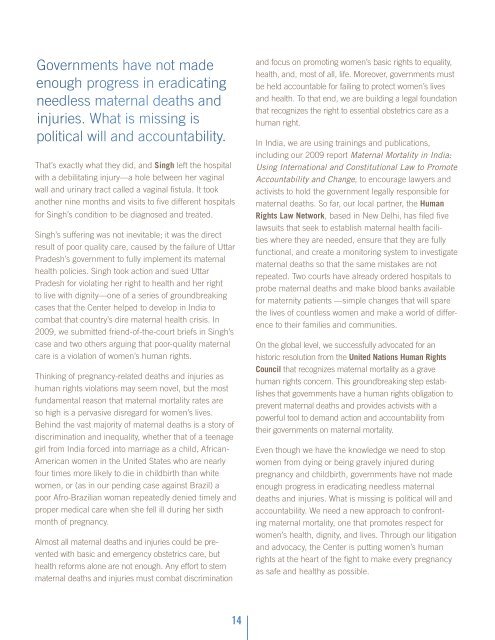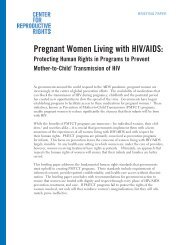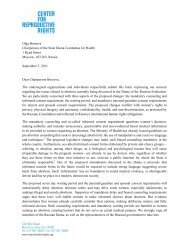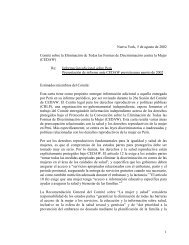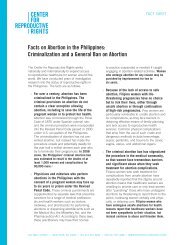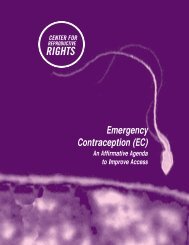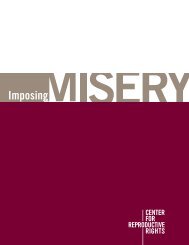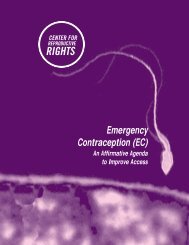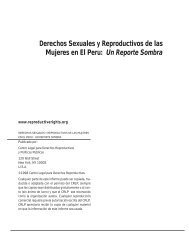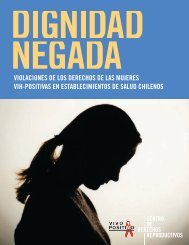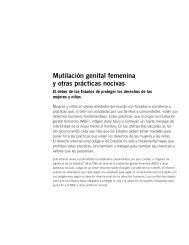CRR Annual Report 2009 - Center for Reproductive Rights
CRR Annual Report 2009 - Center for Reproductive Rights
CRR Annual Report 2009 - Center for Reproductive Rights
You also want an ePaper? Increase the reach of your titles
YUMPU automatically turns print PDFs into web optimized ePapers that Google loves.
Governments have not made<br />
enough progress in eradicating<br />
needless maternal deaths and<br />
injuries. What is missing is<br />
political will and accountability.<br />
That’s exactly what they did, and Singh left the hospital<br />
with a debilitating injury—a hole between her vaginal<br />
wall and urinary tract called a vaginal fistula. It took<br />
another nine months and visits to five different hospitals<br />
<strong>for</strong> Singh’s condition to be diagnosed and treated.<br />
Singh’s suffering was not inevitable; it was the direct<br />
result of poor quality care, caused by the failure of Uttar<br />
Pradesh’s government to fully implement its maternal<br />
health policies. Singh took action and sued Uttar<br />
Pradesh <strong>for</strong> violating her right to health and her right<br />
to live with dignity—one of a series of groundbreaking<br />
cases that the <strong>Center</strong> helped to develop in India to<br />
combat that country’s dire maternal health crisis. In<br />
<strong>2009</strong>, we submitted friend-of-the-court briefs in Singh’s<br />
case and two others arguing that poor-quality maternal<br />
care is a violation of women’s human rights.<br />
Thinking of pregnancy-related deaths and injuries as<br />
human rights violations may seem novel, but the most<br />
fundamental reason that maternal mortality rates are<br />
so high is a pervasive disregard <strong>for</strong> women’s lives.<br />
Behind the vast majority of maternal deaths is a story of<br />
discrimination and inequality, whether that of a teenage<br />
girl from India <strong>for</strong>ced into marriage as a child, African-<br />
American women in the United States who are nearly<br />
four times more likely to die in childbirth than white<br />
women, or (as in our pending case against Brazil) a<br />
poor Afro-Brazilian woman repeatedly denied timely and<br />
proper medical care when she fell ill during her sixth<br />
month of pregnancy.<br />
Almost all maternal deaths and injuries could be prevented<br />
with basic and emergency obstetrics care, but<br />
health re<strong>for</strong>ms alone are not enough. Any ef<strong>for</strong>t to stem<br />
maternal deaths and injuries must combat discrimination<br />
and focus on promoting women’s basic rights to equality,<br />
health, and, most of all, life. Moreover, governments must<br />
be held accountable <strong>for</strong> failing to protect women’s lives<br />
and health. To that end, we are building a legal foundation<br />
that recognizes the right to essential obstetrics care as a<br />
human right.<br />
In India, we are using trainings and publications,<br />
including our <strong>2009</strong> report Maternal Mortality in India:<br />
Using International and Constitutional Law to Promote<br />
Accountability and Change, to encourage lawyers and<br />
activists to hold the government legally responsible <strong>for</strong><br />
maternal deaths. So far, our local partner, the Human<br />
<strong>Rights</strong> Law Network, based in New Delhi, has filed five<br />
lawsuits that seek to establish maternal health facilities<br />
where they are needed, ensure that they are fully<br />
functional, and create a monitoring system to investigate<br />
maternal deaths so that the same mistakes are not<br />
repeated. Two courts have already ordered hospitals to<br />
probe maternal deaths and make blood banks available<br />
<strong>for</strong> maternity patients —simple changes that will spare<br />
the lives of countless women and make a world of difference<br />
to their families and communities.<br />
On the global level, we successfully advocated <strong>for</strong> an<br />
historic resolution from the United Nations Human <strong>Rights</strong><br />
Council that recognizes maternal mortality as a grave<br />
human rights concern. This groundbreaking step establishes<br />
that governments have a human rights obligation to<br />
prevent maternal deaths and provides activists with a<br />
powerful tool to demand action and accountability from<br />
their governments on maternal mortality.<br />
Even though we have the knowledge we need to stop<br />
women from dying or being gravely injured during<br />
pregnancy and childbirth, governments have not made<br />
enough progress in eradicating needless maternal<br />
deaths and injuries. What is missing is political will and<br />
accountability. We need a new approach to confronting<br />
maternal mortality, one that promotes respect <strong>for</strong><br />
women’s health, dignity, and lives. Through our litigation<br />
and advocacy, the <strong>Center</strong> is putting women’s human<br />
rights at the heart of the fight to make every pregnancy<br />
as safe and healthy as possible.<br />
14


